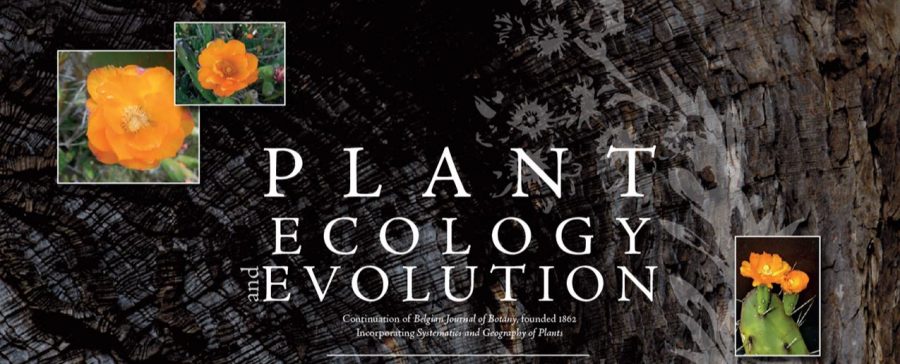Another diamond open-access, peer-reviewed journal – owned by Meise Botanic Garden and the Royal Botanical Society of Belgium – now boasts an improved publishing infrastructure after moving to the technologically advanced ARPHA Platform, developed by scholarly publisher and technology provider Pensoft. Pensoft is eager to welcome a journal with rich history going back to 1862 on its platform.
Plant Ecology and Evolution is a scientific journal devoted to the ecology, phylogenetics, and systematics of all plant groups in the traditional sense (including algae, fungi, and myxomycetes), also covering related fields such as comparative and developmental morphology, conservation biology, evolution, phytogeography, reproductive biology, population genetics, and vegetation studies. Although submissions from all over the world are welcome, the journal has a particular interest in tropical biodiversity, especially from Africa.
Officially launched 12 years ago in 2010, it was established as a merger of the Belgian Journal of Botany and Systematics and Geography of Plants, as their scopes started to overlap significantly, with both focusing mainly on (sub)tropical African botany.
The Belgian Journal of Botany dates back to 1862, when its first volume was published under the name Bulletins de la Société royale de Botanique de Belgique. As for Systematics and Geography of Plants, its publication started in 1902 under the name Bulletin du Jardin Botanique de l’État à Bruxelles.
Plant Ecology and Evolution opted for ARPHA’s white-label solution, benefitting from all of ARPHA’s services and a new user-friendly website, while publishing under the branding and imprint of the two non-profit organisations that support it: Meise Botanic Garden and the Royal Botanical Society of Belgium.
Thanks to their financial support, Plant Ecology and Evolution is published under Diamond Open Access, which means that it is free to read and publish. In addition, it takes advantage of ARPHA’s signature fast-track publishing system, which offers an end-to-end solution from submission to publication, distribution, and archiving. Providing a synergic online space for submission, reviewing, editing, production, and archiving, ARPHA ensures a seamlessly integrated workflow at every step of the publishing process.
The journal will also support publication of the submitted manuscripts on ARPHA Preprints platform developed by Pensoft to streamline public access to the latest scientific findings. The platform allows authors to submit a preprint in a matter of seconds along with their manuscript, with no need to upload any additional files. Once the associated paper is published, a two-way link between the article and the preprint is established via CrossRef.
New articles of Plant Ecology and Evolution will be published in three formats: PDF, machine-readable JATS XML, and semantically enriched HTML for better and mobile-friendly reader experience.
“We chose ARPHA for many reasons, one of which is functionality: the entire editorial process happens online, which provides a smooth experience for authors, reviewers, and editors. ARPHA also allows for the automatic dissemination of biodiversity data to numerous databases. Our journal wants to contribute to making biodiversity data freely available to all in the spirit of open science, and ARPHA makes this possible, easy and automated,”
said Editor-in-Chief, Dr Brecht Verstraete.
“With the ARPHA platform, Plant Ecology and Evolution is stepping into the future of biodiversity publishing,”
he added.
Additional information:
About Meise Botanic Garden:
The history of Meise Botanic Garden dates back to 1796 and it is therefore older than the Kingdom of Belgium. The Garden has a collection of more than 18,000 living plants and has a huge herbarium with approximately 4 million specimens. The Garden also has a botanical library with more than 200,000 books from the 15th century until today. As a research institute, it maps and studies the diversity of plants, mushrooms, and algae covering the whole world, from Antarctica to the rainforests of Congo.
About the Royal Botanical Society of Belgium:
The Royal Botanical Society of Belgium was founded in 1862 and promotes botany through scientific research, publications, and conferences. The members of the society, in Belgium and abroad, are teachers, students, researchers, naturalists, nature reserve managers, etc. The society is open to anyone interested in botany.
About Pensoft:
Pensoft is an independent academic publishing company, well-known worldwide for its innovations in the field of semantic publishing, as well as for its cutting-edge publishing tools and workflows. In 2013, Pensoft launched the first ever end to end XML-based authoring, reviewing and publishing workflow, as demonstrated by the Pensoft Writing Tool (PWT) and the Biodiversity Data Journal (BDJ), now upgraded to the ARPHA Publishing Platform. Flagship titles include: Research Ideas and Outcomes (RIO), One Ecosystem, ZooKeys, Biodiversity Data Journal, PhytoKeys, MycoKeys and many more.
About ARPHA:
ARPHA is the first end-to-end, narrative- and data-integrated publishing solution that supports the full life cycle of a manuscript, from authoring to reviewing, publishing and dissemination. ARPHA provides accomplished and streamlined production workflows that can be customised according to the journal’s needs. The platform enables a variety of publishing models through a number of options for branding, production and revenue models to choose from.
Contact:
Dr Brecht Verstraete, Editor in chief of Plant Ecology and Evolution
Email: brecht.verstraete@plantentuinmeise.be
Prof Lyubomir Penev, CEO and founder at Pensoft and ARPHA
Email: l.penev@pensoft.net

